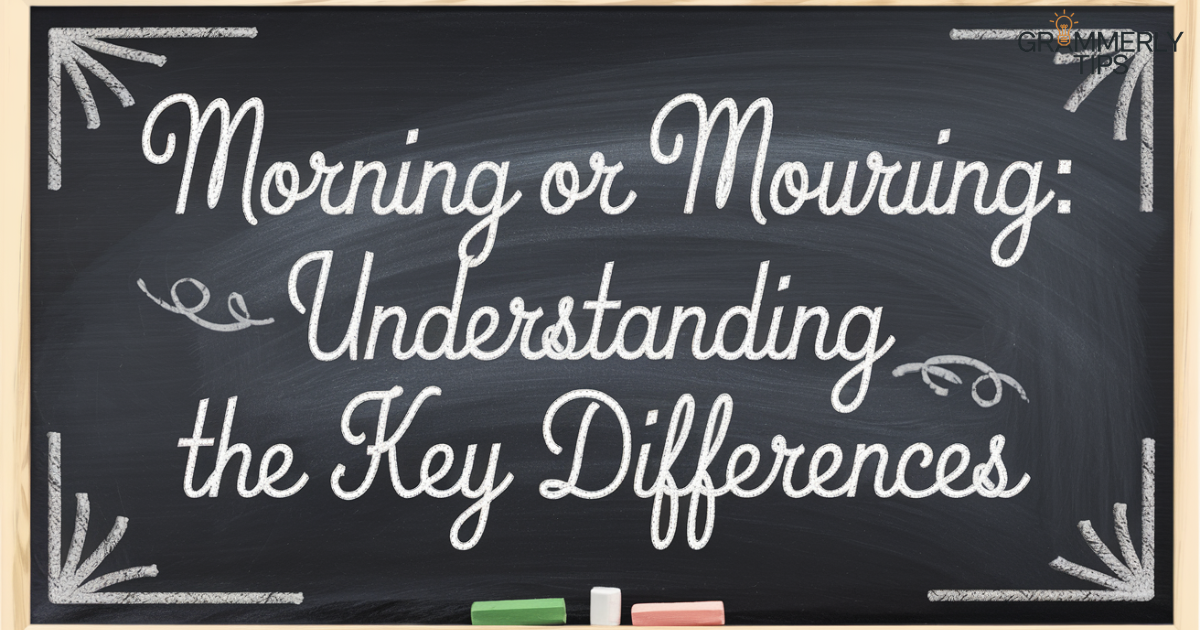Have you ever come across the words morning or mourning and wondered about their differences? These two words sound alike but have entirely distinct meanings and uses. Understanding the nuances between them can help you communicate more effectively and avoid common mistakes.
“Morning” refers to the early hours of the day, symbolizing new beginnings and the promise of light. On the other hand, “mourning” is an expression of deep sorrow, often associated with the loss of a loved one. While they may share similar sounds, their implications are worlds apart. Let’s delve into the key differences and explore their meanings in detail.
Understanding Morning And Mourning

Morning: Definition and Usage
Morning is the early part of the day, typically from sunrise until noon. It symbolizes a fresh start and is often associated with routines like breakfast or exercise. The word is commonly used to describe activities or events that happen in this time frame.
Morning also holds cultural significance in greetings, like saying “Good morning” to begin the day positively.
For Example
- I love waking up early in the morning to watch the sunrise.
- Every morning, she goes for a jog in the park before work.
- He scheduled the meeting for 10 a.m. tomorrow morning.
- The peaceful morning atmosphere makes it my favorite time to read.
You Also Like To Read This: Forrest Or Forest: Clearing Up The Spelling Confusion
Mourning: Definition and Usage
Mourning refers to the deep sorrow and grief felt after the loss of a loved one. It often involves cultural or religious rituals, such as wearing black or holding memorial services. The term can describe both personal feelings and collective expressions of loss.
Mourning is a universal human experience that helps individuals cope with grief. It also signifies respect and remembrance for those who have passed away.
For Example
- She spent months in mourning after the loss of her grandmother.
- The family observed a period of mourning by wearing black clothing.
- The nation was in mourning after the tragic event.
- Mourning rituals vary across cultures, reflecting unique ways of honoring the deceased.
What’s the Difference between Grief and Mourning?
Grief is the internal emotional response to a loss, such as sadness, anger, or confusion. Mourning, on the other hand, is the external expression of that grief through actions, rituals, or traditions. While grief is personal and individual, mourning often involves cultural or societal practices like funerals or memorials.
Both are interconnected but serve different purposes in coping with loss. Understanding this distinction can help provide better support to those dealing with loss.
Side-by-Side Comparison: Morning vs. Mourning
| Aspect | Morning | Mourning |
| Definition | The early part of the day, from sunrise to noon. | The expression of deep sorrow after a loss. |
| Usage | Refers to time or activities during early hours. | Refers to grieving practices or rituals. |
| Emotional Tone | Neutral or positive, symbolizing new beginnings. | Sad and reflective, associated with grief. |
| Example | I love the quietness of the morning. | She is mourning the loss of her father. |
| Cultural Significance | Often used in greetings like “Good morning” | Includes traditions like wearing black or holding funerals. |
| Key Difference | Denotes a specific time of day. | Denotes the process of coping with loss. |
The table highlights the key differences between “morning” and “mourning.” “Morning” refers to the early part of the day and is typically associated with positive or neutral feelings, often used in greetings like “Good morning” In contrast, “mourning” is related to grief and the process of expressing sorrow after a loss, often through rituals or cultural practices.
While “morning” marks a time frame, “mourning” represents an emotional response to death. The key difference lies in their meanings: one focuses on time, and the other on a grieving process.
Everyday Usage Examples

Now we use morning and mourning fits in our everyday language. Here are some examples about that:
Morning
- I like to have a cup of coffee every morning before starting work.
- The morning sun makes the garden look so beautiful.
- He wakes up early in the morning to go for a run.
- I usually check my emails first thing in the morning.
Mourning
- The community gathered in mourning at the memorial service.
- She was in mourning for weeks after the passing of her pet.
- The entire country was in mourning after the tragic accident.
- Mourning the loss of her childhood friend, she spent time reflecting and remembering.
FAQs
What is the difference between morning and mourning?
“Morning” refers to the early part of the day, while “mourning” is the expression of sorrow after a loss. They have different meanings and emotional tones.
How to use morning and mourning in a sentence?
“Morning” can be used to describe time, like in “Good morning” while “mourning” refers to grief, such as in “She was mourning the death of her friend.”
What is the difference between morning and morn?
“Morning” is the full term for the early part of the day, while “morn” is a shortened, poetic version of the word often used in literature.
Which word was first, morning or mourning?
“Mourning” appeared earlier in the English language, with “morning” coming later as a shift in meaning developed over time.
Conclusion
In conclusion, while “morning” and “mourning” may sound alike, they have distinct meanings and uses. “Morning” is associated with the early part of the day and positive activities, while “mourning” relates to the expression of grief after a loss.
Understanding these differences helps avoid confusion in communication. Both words play important roles in language and culture, reflecting different aspects of human experience. Being mindful of their usage ensures clarity in both everyday conversations and more formal contexts.

Grammerlytips.com, authored by Jame, offers expert tips and insights on mastering grammar, enhancing writing skills, and boosting communication effectiveness.

